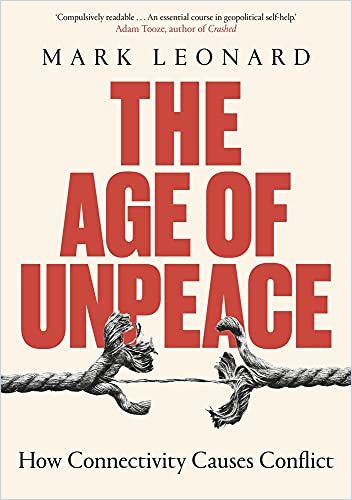Director of the European Council on Foreign Relations Mark Leonard presents a compelling, discouraging overview of the current state of the world: ever-increasing fragmentation and competition.

Continual Discord
Director of the European Council on Foreign Relations Mark Leonard argues that chaos is a feature – not a bug – of globalization and its connectivity. He offers startling insights that may well change your view of how nations and the world function.
Unpeace
Globalization – greater economic interdependence – raises the complexity of international politics and generates friction between and within countries. It increased wealth for some, made others poorer, and fueled awareness and resentment of inequality.
What do Chinese bullying, Russian trolling, American regulation, French blockades, Iranian piracy and Turkish blackmail have in common? They were not random accidents…but new types of political violence.Mark Leonard
Sanctions, blockades, closed borders, supply chain disruptions and hacking are methods of modern combat that blur the lines between war and peace. These new means of battle deny access to food, medicine and power. Academics characterize the current state of world affairs as an “unpeace.”
The United States and China
Tension exists between America and China largely due to their increasing similarity. China features a burgeoning middle class and revolutionizing technology, but the Chinese Communist Party hoards power, tightening censorship and surveillance.
The philosopher René Girard argues that human desire is social and mimetic, rather than intrinsic: People learn what to want from other people. When competing for a desired object or goal, individuals – and global powers – can become obsessed with each other and more alike.
America’s protectionist actions – such as tariffs to ensure that domestic companies remain competitive with foreign ones – incite China’s efforts in blockchain, AI, 5G and quantum computing. The United States now copies China’s state-supported tech development efforts through tariffs, subsidies, industrial policy, and import and export controls.
Technology
Technology connects groups while segregating them; it fosters empathy and fuels envy; and it empowers people while diminishing their agency. In the West, social media is a nexus for advertising dollars, division, surveillance, behavioral manipulation, and the unregulated use of data and political power. In the East, particularly in China, social media is a tool for censorship and repression.
Like-minded online communities embolden people to do and say things they wouldn’t do or say in public. This erodes the healthy restraint and self-censoring that allows society to function. Increased fragmentation online translates into a lack of unity in the real world. It dehumanizes people and turns them into identity categories and data points. As social media feeds envy, dissatisfaction become pervasive.
Living in a world of hyper-comparison, frustrated citizens feel they are losing control of their futures while seeing others across borders surging ahead.Mark Leonard
The belief that unseen, profit-seeking algorithms run the world makes people feel they lack command over their lives, leading to political passivity or futile political rage. Global efforts fragment as nations compete more fiercely.
Trade discourages warfare but increases other discord. Consider Iran: In the early 2000s, the United States and Russia sought less expensive methods of exerting influence abroad, such as financial tactics, cyber warfare and drone attacks. In response, Iran built up its capabilities, launching retaliatory cyberattacks against America and other nations.
Geopolitical Competition
The globalized supply chain and its reliance on the US dollar make financial tactics – sanctions, tariffs, embargoes and boycotts – more deployable. The financialization of warfare began in the wake of September 11, 2001. The Bush administration attempted to track and stop terrorist networks by keeping banks from investing in nations that harbored terrorists. Similar approaches include import and commercial restrictions.
Infrastructure is another area of competition. China, for example, is developing roads and rail links that render other countries, such as Laos, dependent on it for the transport of goods and people. Building up this infrastructure enables potential military maneuvers.
Migrant movements are a political bargaining chip used by weaker powers against stronger ones. Turkey, for example, gained concessions from the European Union by threatening to send it busloads of migrants.
Geopolitical Networks
A “four-world order” provides a new model for understanding global politics. The first three worlds are the United States, the European Union and China; the fourth consists of midsized and smaller nations, including Australia and India. All must avoid clashing with each other.
The United States advocates for a unified, free internet with minimal government regulation. This works well within the liberal global order and free market. America wields its power through gatekeeping and data-mining. Its globalization policy calls for shoring up major industries, introducing digital regulation, strengthening ties to allies, and avoiding war – hot or cold – with China.
The West emphasizes the individual; China focuses on relationships and interdependence. Beijing seeks self-reliance and political power through its dual circulation economy: The “external” economy connects to the outside world, while the “internal” drives national independence and safeguards against foreign influence. China’s power plays include withholding investment from uncooperative countries.
In future years the big flashpoints in geopolitics are less likely to be about control of the land and the sea. Instead, they will be about migration pacts, offshore financial centers, fake news factories, state aid, computer chips, investment protection and currency wars.Mark Leonard
The European Union is a decentralized network with a large market and single currency. Its rules govern member-states’ behaviors, including a “precautionary principle” of trying to solve problems before they happen. The EU sets admirable standards in digital regulation and technology.
Quotidian Chaos
Mark Leonard writes mostly like a diplomat and sometimes like a policy wonk. So his sentences can be dry, and he occasionally oversimplifies. But Leonard proves thoroughly grounded in global politics and economics. He makes a compelling, convincing case for trends that are likely to endure. Leonard’s overview arises from his scholarship and expertise, and from his faith in human nature, which is nil. He regards that nature as the essential fuel for an escalating chaos that he presents as the natural order of things. Yet he isn’t entirely pessimistic: He posits a world of chaotic systems that find a balance, however temporary or, at times, precarious. Investors, executives and political science students will find much sobering wisdom here.










